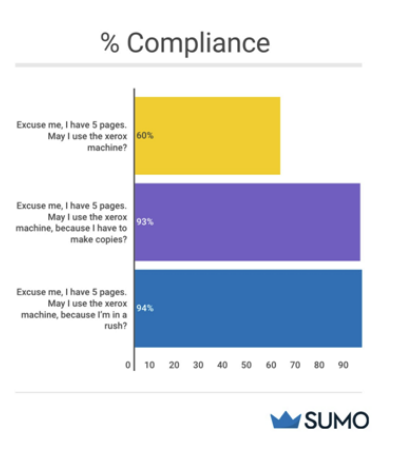‘Words’, without a doubt, are the biggest component of just about any marketing plan related to a small business. Yet, as it so happens, it can often be something that receives relatively little consideration. However, when words are utilized in an effective and strategic manner, they become the catalyst that is needed in order to compel people to initiate action. As such, they can cause others to open their wallets and finance your objectives.
But what if words are used incorrectly? (Sound of crickets chirping in the background)
In most cases, we communicate in order to elicit some form of response. We may wish to inform others, cause them to access an emotion (joy, fear, sadness, etc.) or rally them to do something physical. As such, a small business venture revolves around words, as well.
When you wish your words to have the maximum amount of impact, then you make an effort to choose those words carefully. In addition, you carefully modulate your voice and even consider the facial expressions that will make your point. In essence, it’s similar to creating a piece of art, whether it’s a sculpture or an oil painting.
So ask yourself – “Are the words that you’re currently using designed to assist you in reaching your business goal? Or are you just describing a situation or set of observations?”
The good news is this. It doesn’t take much effort to design your words in a way that will result in a desired action. It really only boils down to technique. So let’s take a closer look.
1. Are you “rambling on” or are you making a point?
How many times have you been at a social gathering and had to endure someone’s seemingly pointless ramblings? It doesn’t mean that they have nothing to say. It just means that they don’t know how to effectively say it.
Even before you begin trying to communicate, you should take note of the words that represent a powerful message. But it depends on the medium that you’re using. For example, have you ever noticed that advertising messages in your email will suddenly be using the same phrases in their titles? That’s because smart advertisers know which words carry the most “power” in an email-based medium. This goes back many years when email advertisers started their messages by calling everyone “Buddy”.
But it’s also important to know that one medium may have a different set of impactful words than another medium. Therefore, it’s important to consider the medium you’re using prior to beginning to relate your message. For example:
- Do you want to engage your audience using social media? Then promote your marketing goals and business with posts from Facebook, LinkedIn or Twitter.
- Do you send out newsletters via email? Then make sure that the subject line is designed to inspire an action.
- Are you creating website copy? Use words that signify benefits to the viewer along with clear and concise content that is informative.
- Are you in a meeting with a client (or potential client)? Then plan to use certain power words that will pique their interest and engage their attention.
2. Are you talking to the wall or an actual person?
The key to writing copy that elicits an action, believe it or not, actually involves talking to someone! All too often, marketing copy ends up merely restating their company’s “benefits” and business “details” that anyone can get in an advertisement. You will want to remember just who your customers are. Once a particular audience is identified, then target that audience. But, above all, make sure you are clear as to what you want them to do!
Also, you don’t want to speak to just their conscious mind – but their subconscious mind, as well. For example, saying “your this” or “your that” speaks directly to the subconscious. That’s because people have a deep-seated relationship with their possessions.
Other words that people love to hear are; “immediately”, “free” and “cutting-edge”. That’s because subconsciously, people want to be included in a group and fear that they may be missing out on something. Just be aware that when including these words in an email title, spam filters can possibly tag your message.
“You need to act NOW!” – is a great example of a phrase that can be very powerful in an email advertisement, but not so much on your website (unless it’s a daily update).
3. Spam isn’t only something you may wish to avoid at lunch!
Besides the stuff that comes in a can, spam can also be the type of email that you should study, as well! Why? First of all, as mentioned earlier, you can learn what current words and phrases have been determined to have the maximum effect on the human psyche. But, there’s a catch.
Nearly 70% of the mail that ends up in people’s spam folders are sent there based on certain words that appear in the subject titles. So be careful how you word your email titles! However, there is one strategy that has proven to be nearly 15% more effective when it comes to getting a reader’s attention. That strategy is the use of personalized emails.
Some of the most successful power words, that will directly appeal to another individual, consist of; the person’s name and the pronouns ‘you’ and ‘we’. These words are considered particularly highly effective when used in newsletters.
Huge Tip: you can obtain software that will allow you to track your emails. This will give you an idea of the effectiveness of your email/newsletter wording.
4. Is your social media engagement limited to just your mom (and lonely people)?
Of course, that’s just a joke – but consider this. Just how many new people are engaging you in social media? All too often, businesspeople don’t seem to notice that the same folks are tuning in and no one new is showing up.
I’m sure you can imagine that certain words encourage more social media activity. However, it can take a bit of effort when it comes to determining which ones they are. That’s because most of them will be specific to the niche that a business caters to.
But, one thing that works consistently is asking for people’s opinions and their knowledge. If you subscribe to a YouTube channel, you’ll see that this technique is used often. Therefore the words; who, what, when, why and how are good to use when attempting to engage your viewer’s feedback.
What works is regularly asking questions, which often induces responses, shares, and likes across platforms. Posts beginning with “what,” “when” and “how” naturally arouse feedback and give you an easy opportunity to engage with customers.
Below, is a graph taken from a study conducted at Harvard University that points out the effect of using just one power word (“because”) in order to elicit an active response. When making a point, it is always more effective to give a succinct reason for someone else’s consideration.

(Source: Sumo, The 8 Persuasive Words That Instantly Help You Sell More, Sarah Peterson, April 21, 2019)
Another group of words that can engage a reader will promise that there is something for them to learn. Here, you’ll have the opportunity to promote yourself as an expert in your industry. These words can include; discover, increase, learn, progress, further develop and improve. At the very least, these words tend to make readers more curious and eager to match their knowledge against yours.
5. At some point, you’re going to have to leave your computer
Effective communication, via online resources, is an excellent way of getting your message across. But face it, at some point you’re probably going to have to actually talk to someone (really).
For many people, this isn’t the easiest thing to do. But, in a remarkably short while, this becomes second nature. As a matter of fact, with practice, you’ll discover that “talking your business” has become second nature. Now, there are those who might say that they already do this. But that’s not the point, here. There is a big difference between describing what you do (and hoping for a positive response) and actually having a conversation that leads to an action.
Just a quick note, though. This form of conversation should be reserved for actual marketing endeavors. If you want to stop getting invited to parties, be the person who always sounds like they want you to buy something from them! I’m sure you’ve seen these types before.
The most powerful words that you can use at the beginning of a conversation are the inquisitive words that are used to determine what someone’s needs are. These include the usual; who, what, when, where, why and how. These words can be used to pinpoint someone’s needs and desires.
But, finally, it’s very important to understand that when you’re communicating within a marketing context, that it’s not just about words. As a matter of fact, you need to limit the amount of your words! That’s because your primary goal should be to listen – as opposed to just talking. People will inherently sense when you’re listening to them, as opposed to ignoring what they really want!
Conclusion
While there are many different aspects of a successful marketing career, there is no doubt that words will sit at the top of the list. The use of power words in marketing will dictate, in most cases, whether or not people will respond to your calls to action. The strength of your campaign will rest on the way that your words resonate with your audience.
For you to get the results that you want; learn which words elicit the most desired responses and use the above 5 tips in order to incorporate them in your marketing efforts. Don’t hesitate to do this today – it will definitely pay off!
